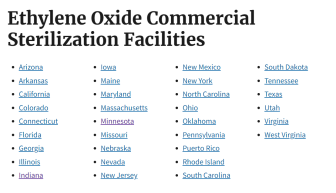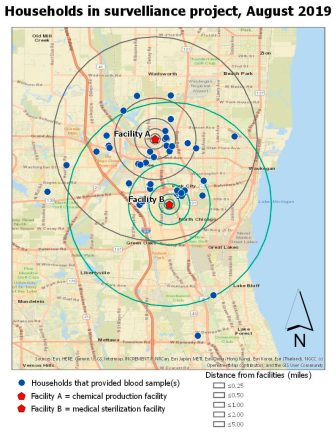
By Vladislava Sukhanovskaya
This is the first story in a 3-part Great Lakes Echo series on toxic hotspots in the region.
Local activists in Illinois are fighting against ethylene oxide (EtO), a dangerous chemical that has been linked to cancer.
There are two facilities in Lake County that use EtO — Vantage Chemical (Gurnee) and Medline (Waukegan). Vantage uses EtO to create products such as “household cleaners, cosmetics and shampoos,” according to its website. Medline uses the chemical to sterilize medical equipment.
Activists at Stop EtO in Lake County have asked for continuous fenceline monitoring of the companies, said Annette Darden, a member of the group.
Fenceline monitoring measures the air concentration of a chemical all along a property line.
Activists from Stop EtO established the nonprofit Lake County Environmental Works and got $270,000 to test the air for EtO. Its U.S. Environmental Protection Agency (EPA) grant was funded through the Biden administration’s American Rescue Plan Act.
The EPA said the grant is one of 132 projects in 37 states that will get $53.4 million to improve air quality monitoring.
“The projects are focused on communities that are underserved, historically marginalized and overburdened by pollution,” the agency said.
In 2021, Stop EtO fought for three bills in the Illinois legislature that would
regulate EtO pollution. However, the most important one, Darden said, would have implemented fence line monitoring but failed to pass in the Senate.
The Illinois EPA responded, saying, “The bipartisan legislation imposed the strictest limits in the nation on ethylene oxide emissions from sterilization facilities and other companies that use ethylene oxide.”
And the U.S. EPA said “There have been significant reductions in EtO emissions in Lake County since 2019.”
It said Medline’s May 2019 permit limits total emissions to 150 pounds of EtO per year, a 95% drop from 2017. Vantage’s December 2019 permit limits emissions to 110 pounds annually, 93% below 2017 estimated emissions.
“EtO emissions from these two facilities have remained below these levels since 2019,” the agency said.
State Rep. Rita Mayfield, D-Waukegan, said that Medline invested over a million dollars in scrubbers and the amount of pollution from its facility went down.
“The other facility, Vantage, did not put anything in theirs,” said Mayfield, referring to scrubbers, “And they are a concern for us.”
The companies didn’t respond to emailed requests for comment.
Measuring distances on Google Maps shows that Vantage is approximately 0.89 miles from Growing Tree Preschool and 0.61 miles away from Spaulding Elementary School.
Mayfield said, “We know that there were cases of children in that area who have developed various forms of lymphoma. We know that because the reporting requirements are basically the honor system.”
She added, “And they’ve had a few spills that they failed to report. We only found out because the employees told us, and then they reported after the fact.”
Right now, companies in Illinois are obliged to report EtO levels four times a year, but it is self-reporting.

States with ethylene oxide commercial sterilization facilities. Image: Environmental Protection Agency
When asked if EtO can be eliminated from the process of sterilization of medical tools, Mayfield said, “I believe that it can be done. Is there a cost associated with it? Absolutely. Which is why the manufacturers are pushing back.”
EtO can cause lymphoid cancer and female breast cancer, according to the EPA.
Darden said, “We’re literally sitting on this cancer. We’re breathing it in every day, and likely, my children could get cancer down the road. Yet we still don’t know because they’re not affording us what we deserve — the testing, the studies.”
She added that Waukegan isn’t a high-income community, so many people don’t have an opportunity to move away from the factories.
Darden lives a mile from Medline. One of her neighbors, who spent her whole life in Waukegan, died of cancer, she said.
Darden continued, “My other neighbor’s son had leukemia. And they moved out here because they were frustrated because they didn’t want to see their son die and then feel as though they were responsible for him dying. And there are other people with breast cancer.”
Darden said that Stop EtO keeps a record of residents who die from cancer.

Map of households that participated in the surveillance project and their proximity to two facilities using EtO. Image: International Journal of Environmental Research and Public Health.
Asked what she feels, Darden said, “Frustration is probably the biggest one.”
“It’s a lack of trust in our government and realizing the implications of that, you can’t put it into words because you’re supposed to trust that your government is taking care of its people and protecting them. And they are not,” she said.
She added, “It seems to be that it’s money over people.”
Stop EtO activists wrote on their Facebook page, “Most politicians we’ve encountered have NOT kept their campaign promises to address EtO pollution. They have lied to our faces.”
Stop EtO started after a situation in the village of Willowbrook where Sterigenics was sterilizing medical equipment with EtO. In 2019, local activists from Stop Sterigenics forced the company to shut down.
Urszula Tanouye, a leader of Stop Sterigenics, said, “We had our state representatives that were also engaged in that area. We had all the surrounding villages.”
She added, “We engaged schools, we made presentations, we talked to the leaders of those units. We were everywhere. And we made ourselves known.“
Sterigenics shut down in 2019 because of an “unstable legislative environment,” Tanouye said.
But Sterigenics still operates in other places. According to the U.S. EPA, the company has facilities that use EtO in seven states, including New York, and one facility in Ontario.
The other Great Lakes states with facilities that use EtO for sterilization are Indiana, Minnesota, Ohio and Pennsylvania, according to the U.S. EPA.
Stop Sterigenics tried to work on the federal level with the Food and Drug Administration to label food products that “have been sterilized with ethylene oxide or propylene oxide,” but the COVID-19 pandemic postponed it, said Tanouye.
Darden said nothing can protect her or her family.
She said a 2020 independent study funded by the Centers for Disease Control and Prevention and conducted in collaboration with researchers from the University of Illinois at Chicago had tested about 100 residents within a mile of the Medline plant.
“My youngest was, I think, 11 at the time, and he tested with elevated hemoglobin levels,” she said.
The study concluded, “These results suggest that facilities that emit EtO may put nearby communities at risk of cancer and other associated health outcomes.”
In the spring, the Waukegan community and Lake County will get testing for EtO through Picarro technology that provides fenceline monitoring of EtO at low concentrations, according to the Picarro website.
Mayfield said, “We need to monitor what is going on. We know that EtO is a class one carcinogen.
“We know that its effect on children is devastating. And well, not just on children, but on the community in general,” she said.
